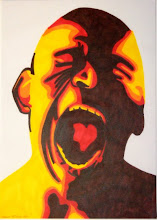La Chinoise (Jean-Luc Godard, 1976)
Godard's La Chinoise is a film surrounded by luck. It is his thirteenth narrative. If you're superstitious, this will be triggering your "triskaidekaphobia" (fear of the number 13). If you're a christian, you're thinking of the Epiphany, or the number of participants at the Last Supper (noting that Judas Iscariot, according to the bible, was the thirteenth seat at the table). If you're a overweight middle schooler being picked for dodge ball in Gym, you're holding back tears from being the extra one in line, chosen last, and sure to be the first one pegged once the game begins.
In my case, the way luck factors into my experience in attending La Chinoise is simply this: I am lucky that after seeing this film, I didn't slap a bystander on the street and enter into a hysterical fit out in the open on the corner of Bleecker Street near NYU. I was expecting to be frustrated, as La Chinoise was made during Godard's obnoxious transitional phase. I was expecting a political gab-fest. I was expecting Jean-Pierre Leaud. I was expecting big, interruptive block lettering in between every scene in pretentious half-sentences.
What I wasn't expecting was a cinematic test-tube baby, attempting to fertilize the phallic hollywood conformo-sperm with its round head of concrete narrative and its flapping, chronological, dramatic flagellum, with the natural antithesis disjunctive egg, wrapped in an esoteric membrane of jump cuts, shaking the petri-dish with its blatant mockery and rejection of narrative form. However, Godard delivered.
I sat, for a torturous two hours and twenty minutes in the most uncomfortable seats in history, the Film Forum theater chairs, staring at a 4:3 screen and trying to get my eyes to focus after a tiring transit across the city. We sat in the front row, so that we would be the first to receive the images, a la Bertolluci. In retrospect, the film was even worse up close in your face, and I ended up only being the first to receive a slipped vertebrae.
I have to remind myself that I have a heart, and give some credit where it is due. The restoration was gorgeous (see, positivity!) and Jean-Pierre Leaud always adds a little padding to even the most disappointing films. Godard's funny bone, as usual, irked out as much laughter as a bad toast by the best man at your good friends wedding (not a plentiful amount). Jean-Pierre stole most of the laughs purely with his body language, with a few chuckles also burgled by a series of upper-class urbanite pro-communist rhetoric recitals spouted by Anne Wiazemsky clad in an outfit reminiscent of Patty Hearst (sans automatic rifle, replaced instead with a toy rifle that folds to look like a stereo).
Up to this point everything was fine. It seemed as though all the film was going to chalk up to be in essence was a silly little riff on how trite the "plight" of the activist middle-class youth forever trapped by their trusts and inheritances from becoming the full-fledged, card-carrying, patch-laden, jungle-hardened revolutionaries they so longed to be, complete with sex appeal and guaranteed peer idolization. I didn't think it would be too bad to sit back and compare how little the same psychosis still linger in the "revolutionary" youth of today, in fact, the colors were nice and the subtitles were big, I was set to just roll on through and cross another Godard off my sticky-pad list.
Then, the median point hits in the film. Godard begins at first to start cultivating a dramatic underpinning amongst the hectic group-think bottled up in the small apart where the majority of the film remains (which is an interesting exploration of space in a way, to give a bit more credit). Suddenly the dialogue becomes segmented, divided between the reminiscences of one of the flat mates talking about how the situation was too much for him, interspersed with inane arguments between the several housemates, complete with peaking audio that could skin a cat out of fright, as well as sentences that start to trickle into the surreal (which I would have been fine with had it not come so severely out of left field) with poetic linguistics fogging up any clarity Godard had established with the first half of his film.
The film ended with a suicide, a homicide (with two tries no less!) and a finale featuring the...er...older sister? of Anne Wiazemsky's character shuttling around the now abandoned flat, ending finally with her scolding their ridiculousness and their negligence in allowing the suicide to happen. Then there were some block letters and a nice Michel Legrand song in the credits to stop me from punching a hole in the wall. The Chinese are in China, not in France.
skip to main |
skip to sidebar

About Me

- H.P. Willis
- - Film Maker - Visual Artist - Film Critic - Music Maker - Poem Writer - Blog Monster -
No comments:
Post a Comment